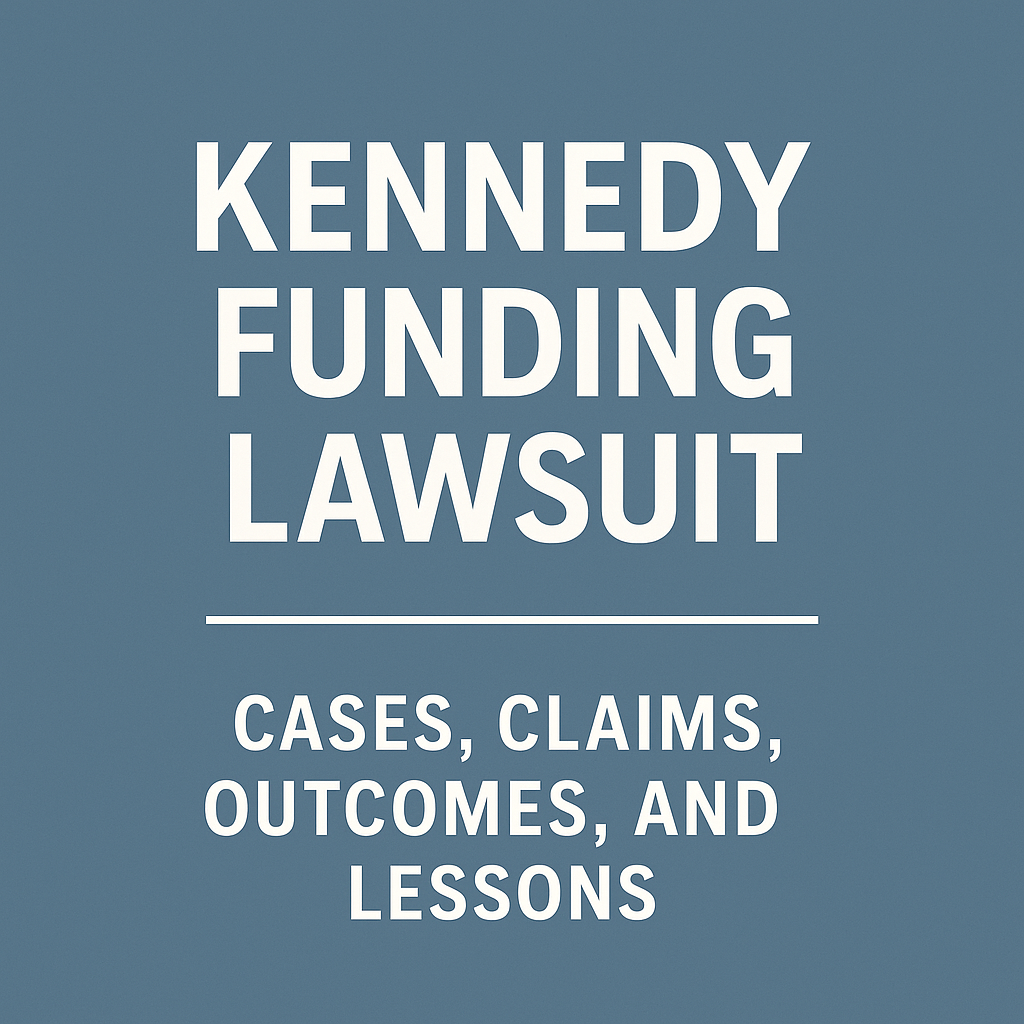Kennedy Funding Lawsuit: Everything You Need to Know
Kennedy Funding Lawsuit Financial is a private lending company in New Jersey. It is often called a hard money lender because it gives fast loans for real estate projects. Many borrowers use Kennedy Funding when banks do not approve their loans Närkes Elektriska
But over the years, Kennedy Funding has been part of many lawsuits. Some borrowers said they lost money after paying large fees. Others said the
mpany did not close loans as promised. Kennedy Funding said it followed contracts and that borrowers failed to meet conditions.
This article explains the lawsuits, the claims made, the defenses, and the lessons for borrowers and lenders.
About Kennedy Funding
Here are some key facts about the company:
-
Based in Englewood Cliffs, New Jersey.
-
More than 30 years in the lending business.
-
Specializes in loans that banks will not approve.
-
Offers bridge loans, land loans, and development loans.
-
Known for fast approvals.
-
CEO is Kevin Wolfer.
Kennedy Funding often works with high-risk borrowers. These are people or businesses that may already face money problems. Because of this, conflicts and lawsuits are more likely.
Major Lawsuits
Kennedy Funding has been part of several lawsuits in U.S. courts. Below are the main cases.
Quimera Holding Group SAC v. Kennedy Funding Financial LLC
-
Case in the U.S. Third Circuit Court of Appeals.
-
Borrower said Kennedy Funding promised a loan but did not close it.
-
Dispute about collateral (the property used as security).
-
District court gave judgment to the borrower.
-
Appeals court canceled that ruling and sent the case back for more review.
-
Case is still open.
Omni Credit Alliance v. Kennedy Funding Case in the U.S. Third Circuit Court of Appeals.
-
Borrower paid large fees for a loan that never closed.
-
Court said Kennedy Funding did not act in good faith.
-
Judge used strong words against the company.
-
Borrower won; the contract was canceled.
Kennedy Funding v. Greenwich Landing
-
Kennedy Funding acted as the plaintiff.
-
It sued to foreclose on a property after a borrower defaulted.
-
Showed Kennedy Funding also uses courts to enforce contracts.
Stone Harbor Estates v. Kennedy Funding
-
Case in the New Jersey Appellate Division.
-
Included Kennedy Funding and CEO Kevin Wolfer.
-
Both borrower and lender appealed parts of the ruling.
-
Court made a mixed decision.
Common Allegations
Borrowers have made similar claims in different lawsuits:
-
Large non-refundable fees charged upfront.
-
Loans promised but never closed.
-
Misrepresentation of loan terms.
-
Wrong or unclear collateral values.
-
Breach of contract.
-
Fraud or consumer fraud.
-
Lack of good faith in negotiations.
Kennedy Funding’s Defense
Kennedy Funding has also defended itself in court. Its main arguments are:
-
Contracts are clear: borrowers sign documents that explain all terms and fees.
-
Borrower errors: loans fail because borrowers do not provide documents, collateral, or clear property titles.
-
Risk is high: hard money loans always involve risk, so disputes are common.
-
Court rulings: some cases have been dismissed or reopened, which Kennedy Funding views as success.
Case Outcomes
The lawsuits have different results. Some favored borrowers, some favored Kennedy Funding, and some are still in progress.
Public Perception
Kennedy Funding lawsuits are also discussed outside the courts.
-
Online complaints: many borrowers wrote on consumer sites about fees and failed loans.
-
Blogs: legal blogs warn borrowers about risks.
-
Law firm news: Kennedy Funding’s lawyers publish announcements when the company wins or gets a case reopened.
-
Media: some business articles note the lawsuits but also say Kennedy Funding provides loans when banks will not.
This creates a divided view. Some people see Kennedy Funding as a useful lender. Others see it as a risky choice.
Lessons for Borrowers
Borrowers can learn many lessons from these lawsuits:
-
Read everything: study the loan commitment before signing.
-
Check fees: know if fees are refundable or not.
-
Confirm collateral: make sure the property listed is correct.
-
Ask questions: do not accept unclear terms.
-
Hire a lawyer: get legal advice before paying fees.
-
Be prepared: provide all required documents on time.
Lessons for Lenders
Lenders can also learn from these cases:
-
Use clear contracts that leave no confusion.
-
Be honest during negotiations.
-
Avoid misleading statements.
-
Act in good faith to avoid future lawsuits.
Industry Lessons
The lawsuits also show lessons for the lending industry:
-
Courts play an important role in resolving disputes.
-
Hard money lending fills a gap in the market.
-
Transparency and fairness reduce the chance of lawsuits.
Benefits and Risks of Hard Money Loans
Hard money loans, like those from Kennedy Funding, have both benefits and risks.
Benefits
-
Fast approvals.
-
Money for projects that banks reject.
-
Helpful for risky or unusual deals.
Risks
-
High upfront fees.
-
Strict conditions.
-
Risk of foreclosure.
-
More disputes between lender and borrower.
Key Points at a Glance
| Topic | Key Point |
|---|---|
| Company | Kennedy Funding Financial, private lender in NJ |
| Focus | Hard money loans for real estate |
| Main Issues | Fees, loan closings, collateral, contracts |
| Borrower Claims | Fraud, misrepresentation, breach of contract |
| KFF Defense | Clear contracts, borrower failures, high-risk nature |
| Court Results | Mixed outcomes: some borrower wins, some lender wins |
| Lesson | Borrowers must be careful; lenders must be clear and fair |
Frequently Asked Questions
What is the Kennedy Funding lawsuit about?
The Kennedy Funding lawsuit refers to different court cases involving Kennedy Funding Financial, a private lender. Many of these cases involve claims about high fees, loans that did not close, or disputes over collateral.
Why do borrowers file lawsuits against Kennedy Funding?
Borrowers file lawsuits when they believe they were charged non-refundable fees for loans that never closed or when they feel the loan terms were not explained clearly. Some also allege fraud, breach of contract, or lack of good faith.
What has Kennedy Funding said in its defense?
Kennedy Funding argues that all fees and terms are clearly written in contracts. The company also says that loans sometimes do not close because borrowers fail to provide proper collateral, documents, or clear property titles.
What are some major Kennedy Funding lawsuit cases?
Important cases include:
-
Quimera Holding Group v. Kennedy Funding (2025) – case reopened by the Third Circuit Court of Appeals.
-
Omni Credit Alliance v. Kennedy Funding (2010) – court ruled in favor of the borrower.
-
Kennedy Funding v. Greenwich Landing – a foreclosure case.
-
Stone Harbor Estates v. Kennedy Funding (2023) – mixed decision in New Jersey.
What can borrowers learn from the Kennedy Funding lawsuits?
Borrowers can learn to:
-
Read all agreements carefully.
-
Check if fees are refundable.
-
Confirm which property is listed as collateral.
-
Get legal advice before signing.
Is Kennedy Funding still in business?
Yes, Kennedy Funding is still active as a private lender. It continues to provide fast loans for real estate projects, even though it has been involved in lawsuits.
Conclusion
The Kennedy Funding lawsuits show the risks in private lending. Many disputes come from fees, collateral terms, and loans that do not close. Borrowers said they lost money, while Kennedy Funding said it followed contracts.
Some courts sided with borrowers. Others sided with Kennedy Funding or reopened cases for more review.
The lesson for borrowers is simple: read carefully, ask questions, and get legal advice before paying fees. The lesson for lenders is also clear: be transparent and act in good faith.

